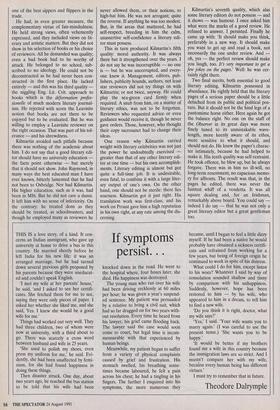If symptoms
persist.. .
THIS IS a love story, of a kind. It con- cerns an Indian immigrant, who gave up university at home to drive a bus in this country. He married shortly before he left India for his new life: it was an arranged marriage, but he had turned down several previous girls proposed by his parents because they were uneducat- ed and couldn't speak English.
`I met my wife at her parents' house,' he said, 'and I asked to see her certifi- cates. She fetched them for me to see, saying they were only pieces of paper. I asked her whether she liked me, and she said, Yes. I knew she would be a good wife for me.'
Things had worked out very well. They had three children, two of whom were now at university, with a third about to go. There was scarcely a cross word between husband and wife in 25 years.
`She used to polish my shoes, even press my uniform for me,' he said. Evi- dently, she had been unaffected by femi- nism, for she had found happiness in doing these things.
Then disaster struck. One day, about two years ago, he reached the bus station to be told that his wife had been knocked down in the road. He went to the hospital where, four hours later, she died. His happiness was destroyed.
The young man who ran over his wife had been driving recklessly at 60 miles per hour; he was given a year's suspend- ed sentence. My patient was persuaded by a relative to bring a civil suit, which had so far dragged on for two years with- out resolution. Every time he heard from his lawyer, his grief came flooding back. The lawyer said the case would soon come to court, but legal time is incom- mensurable with that experienced by human beings.
Meanwhile, my patient began to suffer from a variety of physical complaints caused by grief and frustration. His stomach swelled, his breathing some- times became laboured, he felt a pain across his chest; he had a tingling in his fingers. The further I enquired into his symptoms, the more numerous they became, until I began to feel a little dizzy myself. If he had been a native he would probably have obtained a sickness certifi- cate and refrained from working for a few years, but being of foreign origin he continued to work in spite of his distress.
What could I do for him, except listen to his woes? Whatever I said by way of consolation sounded shallow and tinny by comparison with his unhappiness. Suddenly, however, hope has been restored to him — by his wife, who appeared to him in a dream, to tell him to find a new wife.
`Do you think it is right, doctor, what my wife says?'
`Yes,' I said. 'Your wife wants you to marry again.' (I was careful to use the present tense.) 'She wants you to be happy.'
`It would be better if my brothers found me a wife in this country because the immigration laws are so strict. And I mustn't compare her with my wife, becatise every human being has different virtues.'
I must try to remember that in future.
Theodore Dalrymple


















































 Previous page
Previous page